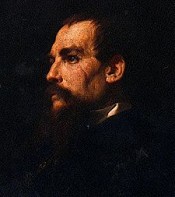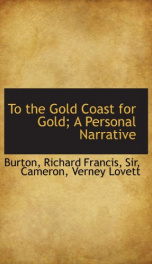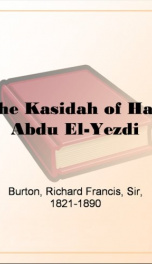Burton Richard Francis Sir

Captain Sir Richard Francis Burton KCMG FRGS (19 March 1821 – 20 October 1890) was an English explorer, translator, writer, soldier, orientalist, ethnologist, linguist, poet, hypnotist, fencer and diplomat. He was known for his travels and explorations within Asia and Africa as well as his extraordinary knowledge of languages and cultures. According to one count, he spoke 29 European, Asian, and African languages.[1] Burton's best-known achievements include travelling in disguise to Mecca, The Book of One Thousand Nights and A Night, an unexpurgated translation of One Thousand and One Nights (also commonly called The Arabian Nights in English after Andrew Lang's abridgement), bringing the Kama Sutra to publication in English, and journeying with John Hanning Speke as the first Europeans led by Africa's greatest explorer guide, Sidi Mubarak Bombay, utilizing route information by Indian and Omani merchants who traded in the region, to visit the Great Lakes of Africa in search of the source of the Nile. Burton extensively criticized colonial policies (to the detriment of his career) in his works and letters. He was a prolific and erudite author and wrote numerous books and scholarly articles about subjects including human behaviour, travel, fencing, sexual practices, and ethnography. A unique feature of his books is the copious footnotes and appendices containing remarkable observations and unexpurgated information. He was a captain in the army of the East India Company serving in India (and later, briefly, in the Crimean War). Following this he was engaged by the Royal Geographical Society to explore the east coast of Africa and led an expedition guided by the locals which discovered Lake Tanganyika. In later life he served as British consul in Fernando Po, Damascus and, finally, Trieste. He was a Fellow of the Royal Geographical Society and was awarded a knighthood (KCMG) in 1886. Burton was born in Torquay, Devon, at 21:30 on 19 March 1821; in his autobiography, he erroneously claimed to have been born in the family home at Barham House in Elstree in Hertfordshire.[2][3] He was baptised on 2 September 1821 at Elstree Church in Borehamwood, Hertfordshire.[4] His father, Lieutenant Colonel Joseph Netterville Burton, 36th Regiment, was an Irish-born British army officer of Anglo-Irish extraction, the son of the Rev. Edward Burton of Newgarden House, Co. Galway, a Church of Ireland clergyman from Westmorland, England, and Maria Margaretta Campbell of Co. Galway. His mother, Martha Baker, was the heiress of a wealthy Hertfordshire squire, Richard Baker. Burton had two siblings, Maria Katherine Elizabeth Burton and Edward Joseph Netterville Burton, born in 1823 and 1824, respectively.[5] Burton's family travelled considerably during his childhood. In 1825, they moved to Tours, France. Burton's early education was provided by various tutors employed by his parents. He first began a formal education in 1829 at a preparatory school on Richmond Green in Richmond, London run by Rev. Charles Delafosse.[6] Over the next few years, his family travelled between England, France, and Italy. Burton showed an early gift for languages and quickly learned French, Italian, Neapolitan, and Latin, as well as several dialects. During his youth, he was rumoured to have carried on an affair with a young Roma (Gypsy) woman, even learning the rudiments of her language. The peregrinations of his youth may have encouraged Burton to regard himself as an outsider for much of his life. As he put it, "Do what thy manhood bids thee do, from none but self expect applause".[7] Richard Francis matriculated at Trinity College, Oxford on 19 November 1840. Before getting rooms in college, he lived for a short time in the house of Dr. William Alexander Greenhill, then physician to the Radcliffe Infirmary. Here he met John Henry Newman, whose churchwarden was Dr. Greenhill. Despite his intelligence and ability, Richard Francis soon antagonized his teachers and peers. During his first term, he is said to have challenged another student to a duel after the latter mocked Burton's moustache. Burton continued to gratify his love of languages by studying Arabic; he also spent his time learning falconry and fencing. In 1842, he attended a steeplechase in deliberate violation of college rules and subsequently dared to tell the college authorities that students should be allowed to attend such events. Hoping to be merely "rusticated"—that is, suspended with the possibility of reinstatement, the punishment of some less provocative students who had visited the steeplechase—he was instead permanently expelled from Trinity College. In a final jab at the environment he had come to despise, Burton reportedly trampled the College's flower beds with his horse and carriage while departing Oxford. In his own words "fit for nothing but to be shot at for six pence a day",[8] Burton enlisted in the army of the East India Company at the behest of his ex-college classmates who were already members. He hoped to fight in the first Afghan war but the conflict was over before he arrived in India. He was posted to the 18th Bombay Native Infantry based in Gujarat and under the command of General Sir Charles James Napier. While in India he became a proficient speaker of Hindustani, Gujarati, Panjabi and Marathi as well as Persian and Arabic. His studies of Hindu culture had progressed to such an extent that "my Hindu teacher officially allowed me to wear the Janeu (Brahmanical Thread)"[9] although the truth of this has been questioned since it would usually have required long study, fasting and a partial shaving of the head. Burton's interest (and active participation) in the cultures and religions of India was considered peculiar by some of his fellow soldiers who accused him of "going native" and called him "the White Nigger". Burton had many peculiar habits that set him apart from other soldiers. While in the army, he kept a large menagerie of tame monkeys in the hopes of learning their language.[10] He also earned the name "Ruffian Dick" for his "demonic ferocity as a fighter and because he had fought in single combat more enemies than perhaps any other man of his time."[11] He was appointed to the Sindh survey, where he learned to use the measuring equipment that would later be useful in his career as an explorer. At this time he began to travel in disguise. He adopted the alias of Mirza Abdullah and often fooled local people and fellow officers into failing to recognise him. It was at this point that he began to work as an agent for Napier and, although details of exactly what this work entailed are not known, it is known that he participated in an undercover investigation of a brothel in Karachi said to be frequented by English soldiers where the prostitutes were young boys. His life-long interest in sexual practices led him to produce a detailed report which was later to cause trouble for Burton when subsequent readers of the report (which Burton had been assured would be kept secret) came to believe that Burton had, himself, participated in some of the practices described in his writing. In March 1849 he returned to Europe on sick leave. In 1850 he wrote his first book Goa and the Blue Mountains, a guide to the Goa region. He travelled to Boulogne to visit the fencing school there and it was there where he first encountered his future wife Isabel Arundell, a young Catholic woman from a good family. Motivated by his love of adventure, Burton got the approval of the Royal Geographical Society for an exploration of the area and he gained permission from the Board of Directors of the British East India Company to take leave from the army. His seven years in India gave Burton a familiarity with the customs and behaviour of Muslims and prepared him to attempt a Hajj (pilgrimage to Mecca and, in this case, Medina). It was this journey, undertaken in 1853, which first made Burton famous. He had planned it whilst travelling disguised among the Muslims of Sindh, and had laboriously prepared for the ordeal by study and practice (including being circumcised to further lower the risk of being discovered). Although Burton was not the first non-Muslim European to make the Hajj (Ludovico di Barthema in 1503 is believed to hold that distinction[12]), his pilgrimage is the most famous and the best documented of the time. He adopted various disguises including that of a Pashtun to account for any oddities in speech, but he still had to demonstrate an understanding of intricate Islamic ritual, and a familiarity with the minutiae of Eastern manners and etiquette. Burton's trek to Mecca was quite dangerous and his caravan was attacked by bandits (a common experience at the time). As he put it, although "... neither Koran or Sultan enjoin the death of Jew or Christian intruding within the columns that note the sanctuary limits, nothing could save a European detected by the populace, or one who after pilgrimage declared himself an unbeliever."[13] The pilgrimage entitled him to the title of Hajji and to wear green head wrap. Burton's own account of his journey is given in A Personal Narrative of a Pilgrimage to Al-Medinah and Meccah (1855). Some members of his entourage suspected there was more to Burton than met the eye. He came close to being discovered one night when he lifted his robe to urinate, rather than squatting as an Arab would. He thought he was unseen, but the youngest member of his group happened to see him. The lad accused him of being an impostor, but let Burton convince him to keep his doubts to himself.[14] When Burton returned to the British Army he sat for examination as an Arab linguist, which he failed.[15] Following his return to Cairo from Mecca, Burton sailed to India to rejoin his regiment. In March 1854, he transferred to the political department of the East India Company and went to Aden on the Arabian Peninsula in order to prepare for a new expedition, supported by the Royal Geographical Society, to explore the interior of the Somali Country and beyond, where Burton hoped to discover the large lakes he had heard about from Arab travellers. It was in Aden in September of this year that he first met Captain (then Lieutenant) John Hanning Speke who would accompany him on his most famous exploration. Burton undertook the first part of the trip alone. He made an expedition to Harar (in present day Ethiopia), which no European had entered (indeed there was a prophecy that the city would decline if a Christian was admitted inside). This leg of the expedition lasted three months, although much of the time was spent in the port of Zeila, where Burton, once again in disguise, awaited word that the road to Harar was safe. Burton not only travelled to Harar but also was introduced to the Emir and stayed in the city for ten days, officially a guest of the Emir but in reality his prisoner. The journey back was plagued by lack of supplies, and Burton wrote that he would have died of thirst had he not seen desert birds and realised they would be near water.
do you like this author?
What readers are saying
What do you think? Write your own comment on this book!
write a commentWhat readers are saying
What do you think? Write your own comment on this author!
write a commentBook list

To The Gold Coast for Gold,Vol. IIA Personal Narrative
Series:
Unknown
Year:
Unknown
Raiting:
3.5/5
Show more
add to favoritesadd In favorites

To the Gold Coast for GoldA Personal Narrative in Two Volumes.—Volume I
Series:
Unknown
Year:
Unknown
Raiting:
3.5/5
Show more
add to favoritesadd In favorites

Personal Narrative of a Pilgrimage to Al-Madinah & Meccah — Volume 2
Series:
Unknown
Year:
Unknown
Raiting:
3.5/5
Show more
add to favoritesadd In favorites
Book list

To The Gold Coast for Gold,Vol. IIA Personal Narrative
Series:
Unknown
Year:
Unknown
Raiting:
3.5/5
Show more
add to favoritesadd In favorites

To the Gold Coast for GoldA Personal Narrative in Two Volumes.—Volume I
Series:
Unknown
Year:
Unknown
Raiting:
3.5/5
Show more
add to favoritesadd In favorites

Personal Narrative of a Pilgrimage to Al-Madinah & Meccah — Volume 2
Series:
Unknown
Year:
Unknown
Raiting:
3.5/5
Show more
add to favoritesadd In favorites

Personal Narrative of a Pilgrimage to Al-Madinah & Meccah — Volume 1
Series:
Unknown
Year:
Unknown
Raiting:
4/5
Show more
add to favoritesadd In favorites

Two Trips to Gorilla Land and the Cataracts of the Congo Volume 2
Series:
Unknown
Year:
Unknown
Raiting:
5/5
This Elibron Classics book is a facsimile reprint of a 1876 edition by Sampson Low, Marston, Low, and Searle, London.
Show more
add to favoritesadd In favorites

Two Trips to Gorilla Land and the Cataracts of the Congo Volume 1
Series:
Unknown
Year:
Unknown
Raiting:
3.5/5
This Elibron Classics book is a facsimile reprint of a 1876 edition by Sampson Low, Marston, Low, and Searle, London.
Show more
add to favoritesadd In favorites

To the Gold Coast for Gold
Series:
Unknown
Year:
Unknown
Raiting:
1/5
This book was converted from its physical edition to the digital format by a community of volunteers. You may find it for free on the web. Purchase of the Kindle edition includes wireless delivery.
Show more
add to favoritesadd In favorites

Personal Narrative of a Pilgrimage to Al-Madinah & Meccah — Volume 2
Series:
Unknown
Year:
Unknown
Raiting:
4.5/5
Show more
add to favoritesadd In favorites

Personal Narrative of a Pilgrimage to Al-Madinah & Meccah — Volume 1
Series:
Unknown
Year:
Unknown
Raiting:
4/5
Show more
add to favoritesadd In favorites

The Kasidah of Haji Abdu El-Yezdi
Series:
Unknown
Year:
Unknown
Raiting:
2.5/5
The Kasidah of Haji Abdu El-Yezdi is one of the best books written by Sir Francis Richard Burton expressing his philosophy and views on the life and society. Kasidah is translated as Testament and means the claims of the author in which he is strongly persuaded and which are usually connected with the speculations about the meaning and consequences of death. Burton is a true intellectual having a good master of Western philosophy and religion. This book would be a real discover for everyone who is interested in Burton's works, Sufi poetry or in the philosophy of agnosticism and just in powerful works which make a strong influence on people's mind.
Show more
add to favoritesadd In favorites

First Footsteps in East Africa
Series:
Unknown
Year:
Unknown
Raiting:
4/5
Captain Sir Richard Francis Burton was an English explorer, translator, writer, soldier, ethnologist, linguist, poet, and diplomat. He was known for his journeys and explorations all over Asia and Africa as well as his extraordinary knowledge of languages and cultures. One of the greatest Burton’s travels is a journey to Africa, when he was engaged by the Royal Geographical Society to explore the east coast of Africa and led an expedition guided by the locals which discovered Lake Tanganyika. "First Footsteps in East Africa" is one of the most exciting books written by Burton. This is a treasury of detailed information on Muslim beliefs, manners and morals. In addition it opens all the pleasures and perils of the desert. This work is a real wealth of geographic, ethnographic and linguistic information that will definitely be interesting for everyone who wants to know as much as possible about other cultures.
Show more
add to favoritesadd In favorites

Vikram and the Vampire; Classic Hindu Tales of Adventure, Magic, and Romance
Series:
Unknown
Year:
Unknown
Raiting:
4/5
Show more
add to favoritesadd In favorites
What readers are saying
What do you think? Write your own comment on this author!
write a commentif you like Burton Richard Francis Sir try:
readers also enjoyed
What readers are saying
What do you think? Write your own comment on this author!
write a commentGenre
if you like Burton Richard Francis Sir try:
readers also enjoyed
Do you want to read a book that interests you? It’s EASY!
Create an account and send a request for reading to other users on the Webpage of the book!


